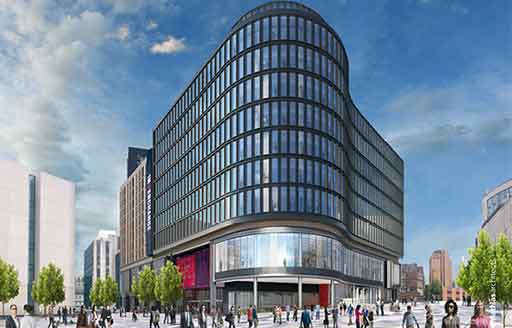
Who better than the banks to realise the cost of inaction instead of building back better
Asset managers by enterprise, the banks will be weighing up the implications of rationalising and restructuring their estates. Whilst taking the moment to reset and assess their global footprint, adopting smart building technology could hold the key to accelerating further efficiency gains.
As I reflect upon last year since the pandemic first took hold, and as the pathway to post-pandemic life unfurls - it’s no secret that adapting will take time and we’re all having to learn as we go.
If there was ever a sector to bank on to respond to a global crisis by reinventing and rebuilding however, then the financial sector is already at the top of its game.
Being at the top requires top talent; the greatest currency of leading financial institutions across the world over. Listening to their internal stakeholders and promoting their wellbeing is rising to the top of the agenda for many discerning banks. As time goes on, a new hybrid model of working seems to be increasingly accepted as a potential outcome that can deliver for organisations and their people.
Asset managers by enterprise, the banks will be weighing up the implications of rationalising and restructuring their estates. Whilst taking the moment to reset and assess their global footprint, adopting smart building technology could hold the key to accelerating further efficiency gains.
As we focus our minds on a bold new future, we mustn’t lose sight that a perhaps even greater challenge is already upon us, where the cost of inaction is even higher – that of environmental impact. The built environment and building performance has a crucial to play if we are to reach our net zero commitments.
When it comes to wellbeing, it’s crucial to create opportunity and choice.
If there was ever a sector to bank on to respond to a global crisis by reinventing and rebuilding however, then the financial sector is already at the top of its game.
Being at the top requires top talent; the greatest currency of leading financial institutions across the world over. Listening to their internal stakeholders and promoting their wellbeing is rising to the top of the agenda for many discerning banks. As time goes on, a new hybrid model of working seems to be increasingly accepted as a potential outcome that can deliver for organisations and their people.
Asset managers by enterprise, the banks will be weighing up the implications of rationalising and restructuring their estates. Whilst taking the moment to reset and assess their global footprint, adopting smart building technology could hold the key to accelerating further efficiency gains.
As we focus our minds on a bold new future, we mustn’t lose sight that a perhaps even greater challenge is already upon us, where the cost of inaction is even higher – that of environmental impact. The built environment and building performance has a crucial to play if we are to reach our net zero commitments.
When it comes to wellbeing, it’s crucial to create opportunity and choice.

The technology to work remotely and remain connected beyond the confines of our office walls has been at our fingertips for decades. However, as our research shows, those who feel their employer offers a good quality workspace are much more likely to positively rate their employer’s performance when it comes to articulating vision, creating a sense of belonging, thinking innovatively and collaborating effectively.
Having to shift to remote working without warning was something that understandably, alarmed many employers. However, in many cases executives have been surprised by the minimal impact on productivity. Despite this, our data shows that respondents feel that their employers are somewhat underperforming in their most important objectives in the wake of Covid-19 including productivity and efficiency as well as customer satisfaction and employee retention.
We also identified that the main reasons for financial services employees not wanting to work from home all the time is that they wouldn’t have the same contact and sense of team with their colleagues and that they enjoy having a work/life distinction. In fact, a high proportion of those in financial services would prefer to be in the office between two and five days a week for their optimum personal productivity.
Having to shift to remote working without warning was something that understandably, alarmed many employers. However, in many cases executives have been surprised by the minimal impact on productivity. Despite this, our data shows that respondents feel that their employers are somewhat underperforming in their most important objectives in the wake of Covid-19 including productivity and efficiency as well as customer satisfaction and employee retention.
We also identified that the main reasons for financial services employees not wanting to work from home all the time is that they wouldn’t have the same contact and sense of team with their colleagues and that they enjoy having a work/life distinction. In fact, a high proportion of those in financial services would prefer to be in the office between two and five days a week for their optimum personal productivity.

When asked to what extent individuals felt proud to work for their organisation, we saw a significant decline from those who have been working at home on a full-time basis since the start of the pandemic. Seeing a disconnection from physical workplace align with a 10% dip in professional pride in just six months should serve as a wake-up call for organisations, if they are to avoid a potentially slippery slope towards more transactional relationships with their most-valued people
In tandem, 66% would be significantly more likely to stay with their current employer if they were offered the flexible work balance they consider optimal for their personal well-being. This all seems to be leading to the realisation that it could be a missed opportunity not to explore the mutual benefits of a hybrid-model.
It is important to note that well-being means different things to different people – what is crucial is to create opportunity and choice. No one size fits all and it’s is important to consider the importance of neurodiversity. No one individual responds best to the same environmental factors, and there can be huge variances in what is required to best perform different tasks and roles. So even within businesses practices may vary by function, with policies and spaces that are flexible enough to accommodate a range of needs on any given day.
Smart buildings could hold the key to driving efficiencies.
From remote working to critical cloud infrastructure and security, the impact of technology has totally transformed the workplace. Its adoption is changing the face of the work itself - the fintech market is continuing to grow at an explosive rate, expanding access to financial services in the wake of the pandemic.
Whilst reimagining the role of their estate, asset managers will not have lost sight of the importance of taking a global, data-driven approach to evaluating the performance of their building stock. Front and centre is the need to stay connected, using smart digital solutions to increase security whilst reducing inefficiencies and cost.
Big data, that is so readily analysed by the banks every day in their markets, also applies to buildings. Property portfolios need to work more efficiently from the use of space to the running costs, as do the people that occupy them. There is a growing need for smarter building technology and software that can optimise the performance of buildings in use. The key to this is collaborating with a partner that can help commission and integrate with your network.
Reset for a sustainable rebound.
While the stock market saw a considerable downturn in 2020, impacting the value of many businesses around the world, Environmental, Social, Governance (ESG) stocks outperformed the rest. This has led many commentators to suggest that sustainability could be at the heart of future recovery across all sectors.
Before the outbreak, a large number of organisations had made bold commitments to improve their green credentials. These commitments will still need to be met and within the same timeframe if we are to respond effectively to the challenge of climate change. A quarter of all CO2 emissions comes from buildings, so the built environment has a critical role to play – and the global community needs to reduce energy consumption by over 80% if we are to reach zero-carbon targets.
The day-to-day efficiency of properties will be key to cutting the energy consumption, so we have a responsibility to educate people about the full operational potential of their spaces. Ultimately, the longer building owners and occupiers wait to act, the harder and more costly it could become to bring the current building stock up to the required level.
If we are to chart a sustainable future, first we need to understand where we are now. ISG’s Sustainable Buildings Monitor provides data on the regional emissions and energy consumption produced by the operation of commercial buildings. By understanding the data, we can better support those regions and sectors that have the most work to do in cutting the emissions produced by the buildings that occupy them – delivering solutions to champion energy efficiency, create smart spaces, and retrofit existing ones too – and take radical steps on the journey to securing a net zero legacy for our cities, towns and communities.
If the Covid-19 crisis has taught us anything, it is that coming together as a community means we can solve the big problems that our world faces.
Author: Lee Phillips
Managing Director, UK Fit Out
In tandem, 66% would be significantly more likely to stay with their current employer if they were offered the flexible work balance they consider optimal for their personal well-being. This all seems to be leading to the realisation that it could be a missed opportunity not to explore the mutual benefits of a hybrid-model.
It is important to note that well-being means different things to different people – what is crucial is to create opportunity and choice. No one size fits all and it’s is important to consider the importance of neurodiversity. No one individual responds best to the same environmental factors, and there can be huge variances in what is required to best perform different tasks and roles. So even within businesses practices may vary by function, with policies and spaces that are flexible enough to accommodate a range of needs on any given day.
Smart buildings could hold the key to driving efficiencies.
From remote working to critical cloud infrastructure and security, the impact of technology has totally transformed the workplace. Its adoption is changing the face of the work itself - the fintech market is continuing to grow at an explosive rate, expanding access to financial services in the wake of the pandemic.
Whilst reimagining the role of their estate, asset managers will not have lost sight of the importance of taking a global, data-driven approach to evaluating the performance of their building stock. Front and centre is the need to stay connected, using smart digital solutions to increase security whilst reducing inefficiencies and cost.
Big data, that is so readily analysed by the banks every day in their markets, also applies to buildings. Property portfolios need to work more efficiently from the use of space to the running costs, as do the people that occupy them. There is a growing need for smarter building technology and software that can optimise the performance of buildings in use. The key to this is collaborating with a partner that can help commission and integrate with your network.
Reset for a sustainable rebound.
While the stock market saw a considerable downturn in 2020, impacting the value of many businesses around the world, Environmental, Social, Governance (ESG) stocks outperformed the rest. This has led many commentators to suggest that sustainability could be at the heart of future recovery across all sectors.
Before the outbreak, a large number of organisations had made bold commitments to improve their green credentials. These commitments will still need to be met and within the same timeframe if we are to respond effectively to the challenge of climate change. A quarter of all CO2 emissions comes from buildings, so the built environment has a critical role to play – and the global community needs to reduce energy consumption by over 80% if we are to reach zero-carbon targets.
The day-to-day efficiency of properties will be key to cutting the energy consumption, so we have a responsibility to educate people about the full operational potential of their spaces. Ultimately, the longer building owners and occupiers wait to act, the harder and more costly it could become to bring the current building stock up to the required level.
If we are to chart a sustainable future, first we need to understand where we are now. ISG’s Sustainable Buildings Monitor provides data on the regional emissions and energy consumption produced by the operation of commercial buildings. By understanding the data, we can better support those regions and sectors that have the most work to do in cutting the emissions produced by the buildings that occupy them – delivering solutions to champion energy efficiency, create smart spaces, and retrofit existing ones too – and take radical steps on the journey to securing a net zero legacy for our cities, towns and communities.
If the Covid-19 crisis has taught us anything, it is that coming together as a community means we can solve the big problems that our world faces.
Author: Lee Phillips
Managing Director, UK Fit Out


